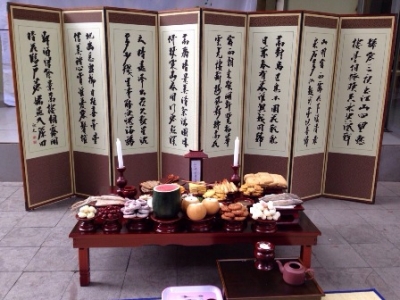The Korean Cultural Centre in Ha Noi on February 7 organised a programme to introduce Hanoians with traditional Korean ceremonies and rituals used to welcome the lunar New Year, as well as the traditional dishes Korean people enjoy on the first days of the New Year.

Offerings on the altar of Korean people on the traditional New Year
Entitled “Experience the traditional New Year culture of Korea", the event drew the participation of cultural researchers, food experts from Viet Nam and Korea, as well as many Vietnamese young people who love Korean culture.
Master Kim Yeong Mi, a Korean food expert introduced the arrangement and process of setting up the traditional altar of Korean people, as well as the rituals and meanings of the various offerings on the altar, in order to help attendees of the event have a better idea of the worshipping rituals of Korea.
Professor Mai Ngoc Chu, chairman of the Korean Research Association of Viet Nam, said that Viet Nam and Korea have many cultural similarities, particularly seen in the way both countries welcome their traditional lunar New Year. Both Vietnamese and Korean’s celebrate the New Year at the beginning of spring, according to the lunar calendar, as well as ceremonies worshipping ancestors and family, a custom that is a precious tradition of both nations.
Also included in the programme, a culinary expert guided participants on how to make some simple dishes for offerings on the first days of the New Year, such as salads, fried cakes and numerous others.
Park Nark Jong, Director of the Korean Cultural Centre in Viet Nam said that by experiencing the arrangement of the altar of Korean tradition in the Lunar New Year, young Vietnamese people have the opportunity to compare the similarities and differences in cultural traditions of the two countries, thereby creating consideration and a deep understanding between the two people. The programme also aims to introduce young people with traditional culture, which is fading in the present time, helping them to understand and respect the culture, he added.